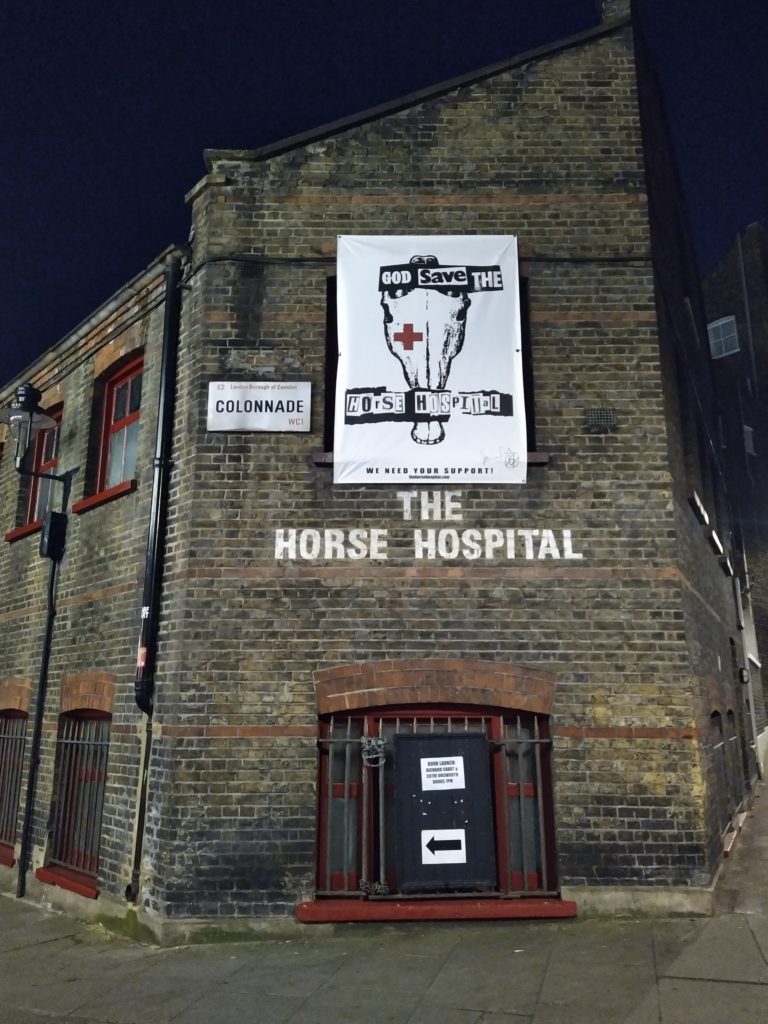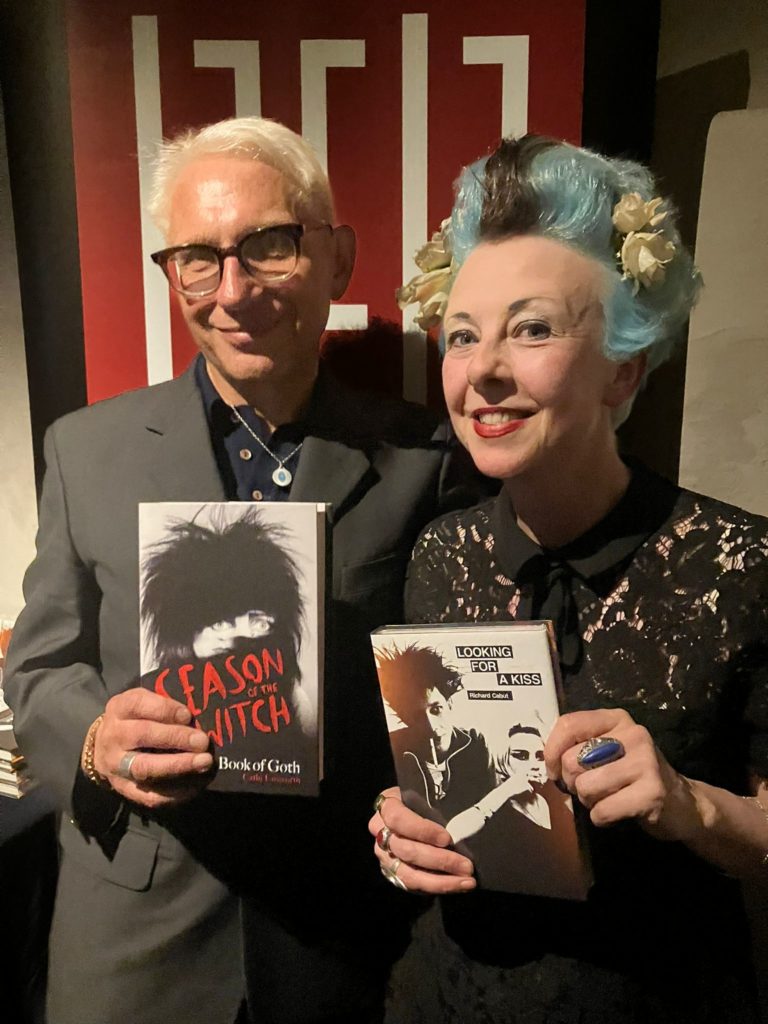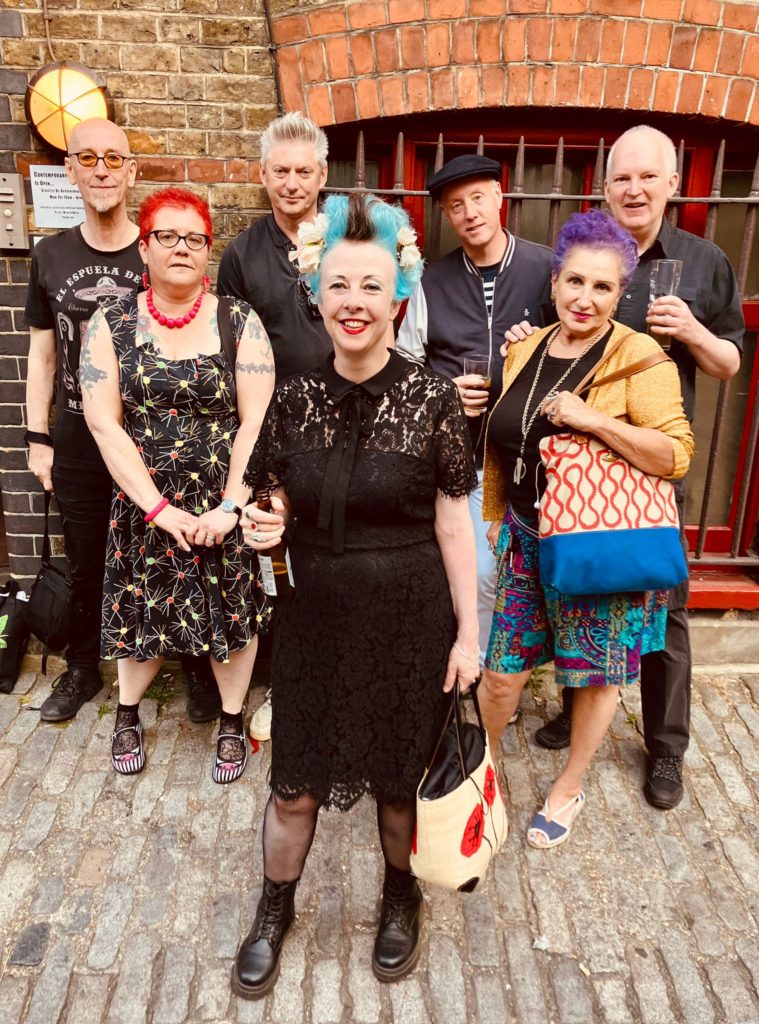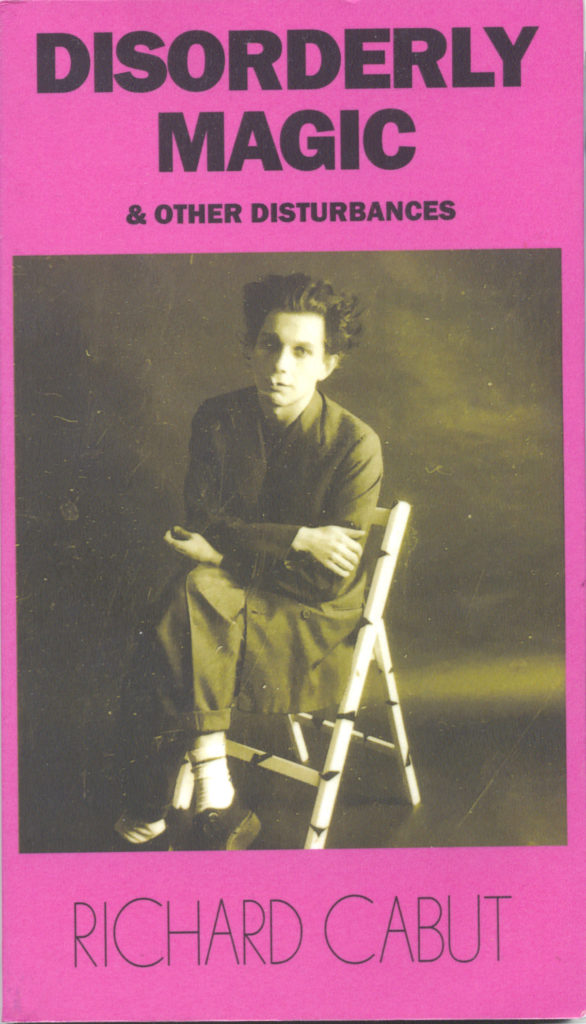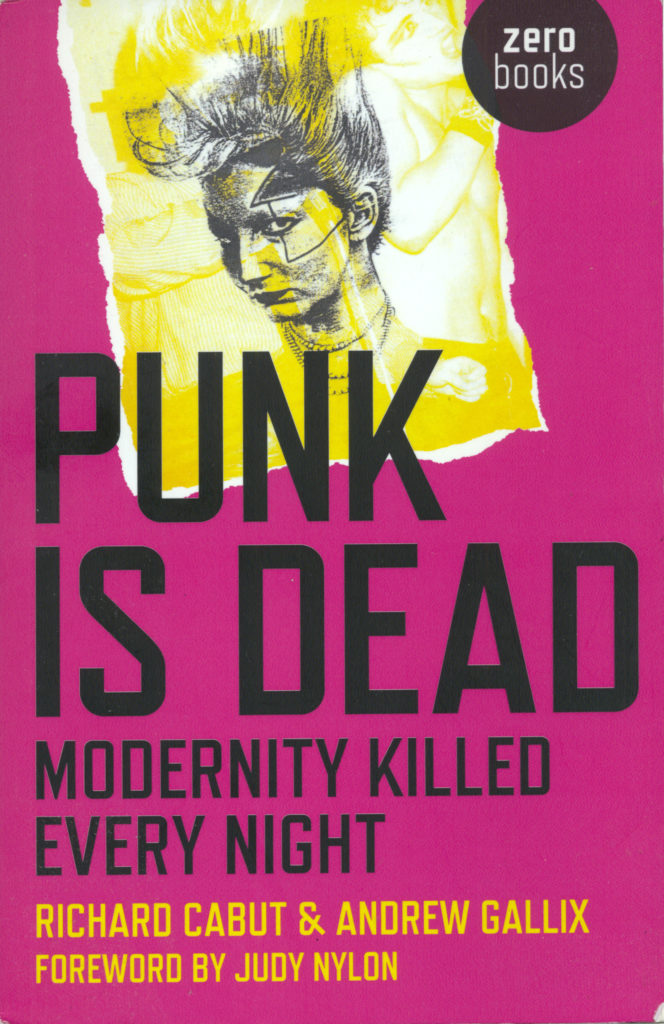
Looking For A Kiss – PC-PRESS.
A story of two lovers, Robert, and Marlene, who’s love has long faded. The story is mostly based in the early eighties, in and around the London of that period, a London that is now largely gentrified. The story seems to float around in a dream-like state – an acid trip interrupted by numerous speed comedowns. This is a mood book written with colourful and magical tones, but it also written with stark black and white tones. The two drug experiences gives the reader a clue to which passages would be which.
There is no specific plot as such, more an examination of the two souls breaking apart. The situations and descriptions and the words spoken within these pages are sometimes angry, and if angry then the words are liable to be vicious, and sometimes spiteful. This leads to a sense of hopelessness for the two souls, one of whom, Marlene, seems to be suffering from an undiagnosed mental illness issue. Adding the comparative youth of both, with all the anxieties of living in dismal squats or other cheap housing and dreaming BIG in the big city (any big city) and with the the constant feeling of failure. Nothing in these environments seems to be helping bring these two souls back together.
The two souls spend their meagre dole allowance on too much drink, and too many drugs, seemingly accepting each day as boring as the last. On occasions, and just for the sake of it, one of them would offer an uncaring and unloving sex session. Normally Robert, as Marlene considers herself ugly and sexless, she is constantly haunted by the horrible words of old boyfriends and her father. There is a lot of descriptive sex across these pages – these pages really are the FILTH and the FURY!
Metaphorically, this story is like a car crashing on a road high up in the mountains, teetering on the edge, with a worrying loud creak as gravity tries to take the car crashing down to the ground. The worrying creaks get louder with every page turned. We all know this relationship is not going to get any better and will come crashing down.
There are some curveballs within the story. A chapter in New York set in the latter eighties for instance, with Robert hanging out with (the Lou Reed loathed) Nat Finkelstein, a hanger on at Andy Warhol’s silver Factory space, and photographer of many of the Velvet Undergrounds most famous, and famed images.
This book is a difficult read in places, but it helped me to have a musical backing of Sex Pistols ‘Spunk’ album on, or any Sex Pistols live performance from 1976 (the Burton on Trent performance is a good choice) whilst reading. Marlene and Robert are both inspired by punk rock. The ’76 vintage punk rock. Marlene leans on this ’76 vintage punk rock crutch throughout, wavering not. Robert is not necessary so obsessive, but nevertheless appreciative of one of his early music and fashion backgrounds.
Marlene wants to be a punk rock star, Robert a respected writer. In the story both are neither.
This is a ‘fictional’ book, but if it was not a fictional book, then I would perhaps hope that both ‘Marlene’ and ‘Robert’ got to where they both wanted to get to in the early eighties, within their separate and joined arcs, even if it was for a brief time.
Doomed punk youth. Teenage perversity. Post-punk faded chic. Personality crises. Feelings bleached out. Speed, art / sex, pop / art (distance – Warhol / Duchamp). Advertising slogans for the future. Breakdown, breakup, and breakout. The Spectacle. Primal scenes, screams and schemes.
This special extended and amended edition features new text, photos, and artwork. There are introductions by brilliant Jeff Young (Ghost Town, Eastenders, Holby City), Cathi Unsworth (Seasons of the Witch) and the author, non-fiction pieces about the novel’s punk, positive punk, and post-punk background, as well as further original diary entries.
Set in Camden, Camberwell and New York, the book is a fabulous chronicle of speed, madness, and flying saucers (Warhol / Edie Sedgwick reference), acid, pop art, teenage perversity, the nature of melancholy, breakdown, breakup and breakout, the Spectacle, bathroom functions, clairvoyance, personality crises, primal scenes, screams and schemes, the eternal quest for cool and the endless search for redemption. And much more.
‘Looking For A Kiss’ is the post-punk classic novel. Whilst immersing themselves in drugs, sex, magic, chaos, and the post-punk music of the time our protagonists Robert and Marlene struggle to find themselves and their lives in Camden, London, England. ‘Looking For A Kiss’ is cool, clever, magical, literary, and very, very exciting. The author has found his distinctive voice and train of thought / ideas. It’s a novel of insight, wild characterisation, and statement. For those who remember the gritty Camden Town / London and the East Village / New York of the 1980s the novel is a trip back to view an unravelling tapestry of moods and images that depict the convulsive and compelling meaning of the times. Looking For a Kiss is not a book of the past: rather its territory is the past, present, and future moulded into a timeless and ongoing form.
REVIEWS
“Totally fabulous and restores my belief in brilliant, subversive subcultures books still being the active source of our imaginative capital. It’s superb in its occupation of alternative realities. An absolute marvel and the writing is just fantastic. Post-cool invites post-punk in the drenched lysergic prism of a novel of addictive transgressions redeemed throughout by the lyrical arc of a prose that elicits lost futures in the defiant present. With Camden as its subculture’s locative, and its green canal the novel’s pineal gland, Robert and Marlene alienated and unknowable to each other in altered states witness each other’s blurred emotions with a philosophic acuity that both stings and leaves astute marks on their dystopian histories. A brilliant, upending book in which ‘Punk was, in effect, a way of stopping your past from becoming your future.’” – Jeremey Reed, poet and author
“A masterpiece… collapsing temporal sensations in a manner evocative of the postmodern condition, seeking transcendent meaning within punk, acid, sex and living in squalor in Camden. Blew my mind.” – Adam Lehrer @safetypropaganda
“Like a bittersweet Coltrane solo crashing into Einstürzende Neubauten. Books like ‘Looking For A Kiss’ are a flare in the dark. I can’t remember a more memorable clutch of individuals stalking the pages of a book in a very long time. Some of the scenes leave one almost afflicted with PTSD. I thought I was beyond shaken by the written word – shocked by anything new exciting and original. The book has the same erotic / violent suspense as Knife In The Water.” – Malcolm Paul, Expat Press.
“A drug-fuelled beat / punk, love / hate story. Like (say) Kerouac, it’s shot through with sadness. Not just the comedown, but the inability to bridge the gulf between the enlightened moment of Beatitude, and the bleak surroundings you exist in the rest of the time.” – Paul Gorman, writer.
“Reminds me more of US post-punk writing… Kathy Acker … Richard Hell… it is raw, cold, desperate, fucked up.” – Michael Gratzke, academic.
“Cool, clever, magical, literary and very, very exciting. There’s some considerable skill and talent here – a contender for book of the year,” – Gregory Hesse, photographer.
‘Brilliant. Amphetamine sharp. It’s not post punk, but Proust punk,’ – Johny Brown, Resonance FM radio host and vocalist with the Band of Holy Joy
‘A Jarmanesque journey in Vivienne Westwood heels, to love’s shrine,’ – David Erdos, International Times
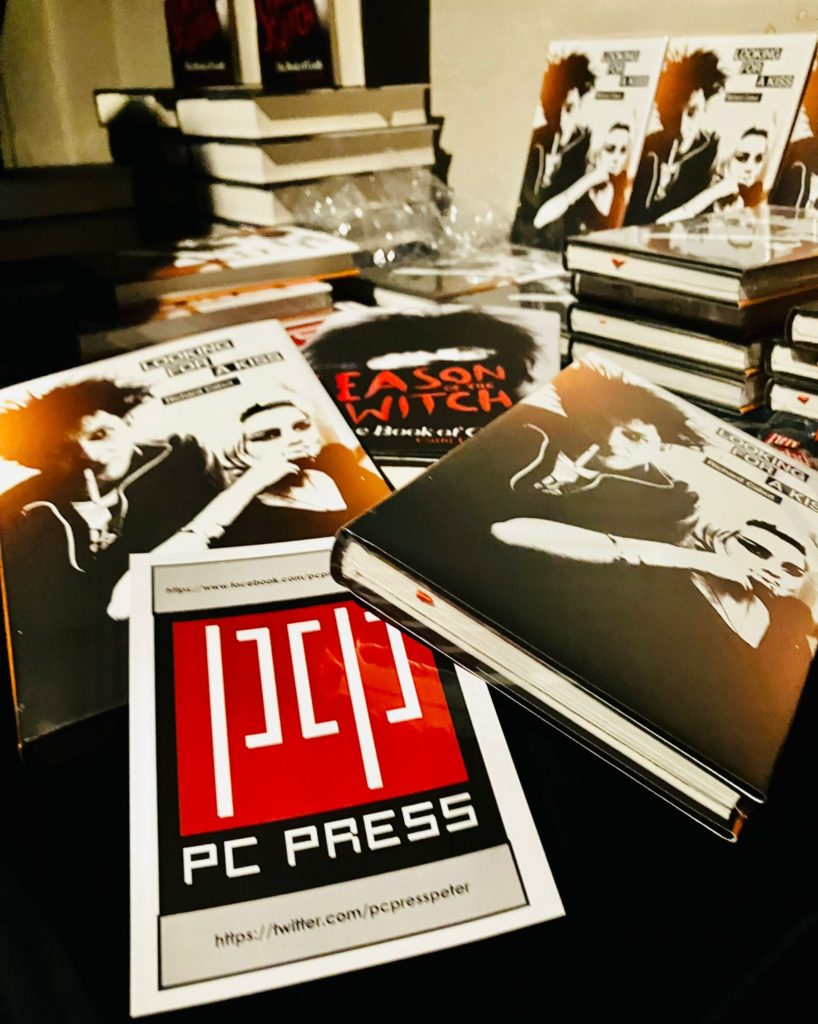
PC-PRESS are an independent, DIY book publishing company that believes in the ongoing importance and centrality of the book and the writer to culture.
Formed in 2013 by Pete Webb with help from Alexei Monroe and Alex Nym, PC-PRESS really values the art form of the book. Their mission to publish and develop work that is about challenging music, counterculture, DIY culture, music scenes, untold cultural history, critical analysis and representations of interesting artists and their work.
With endless enthusiasm for new knowledge, new thinking and wanting to celebrate the transformative power of creative work PC-PRESS is a publisher of quality productions.
The company will also be acting as a music label for varying types of releases.
HERE is the PC-PRESS website where you can get further information on the publishers activities as well as purchase a copy of ‘Looking For A Kiss’.
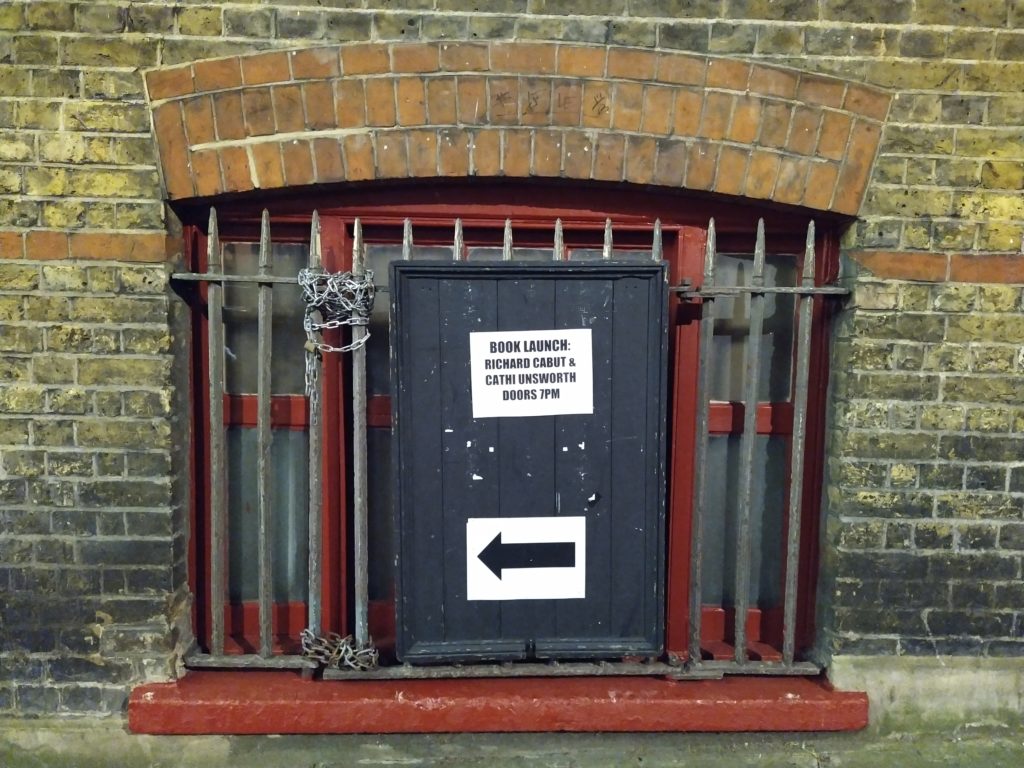
The launch of the book; ‘Looking For A Kiss’ (and Cathi Unsworth’s book; ‘Season Of The Witch’) was held at the Horse Hospital at the Colonnade in London’s Bloomsbury district on the 15th of June. The Horse Hospital is a Grade II listed building, originally built by James Burton in 1797 as stabling for cab drivers’ sick horses. The Horse Hospital is notable for its unique stone tiled floor. Access to both floors is by concrete moulded ramps, the upper floor ramp retains hardwood slats preventing the horses from slipping.
Into this dark old building myself and Tony D walked. Tony met up with some old friends, whereas I reconnected with Richard and Peter Webb, who runs PC-PRESS, the publishing company for this new improved version of ‘Looking For A Kiss’.
The evening was intimate, interesting, and uplifting. Hopefully both Richard and Cathi Unsworth (Season Of The Witch) sold plenty of books.
The original publication of the book was completed in 2000 by Sweat Drenched Press. PC-PRESS newly expanded edition has around seventy extra pages, including essay’s entitled ‘1977’ and ‘KICK’, both written by Richard putting some context to a part of his life in the latter seventies and early eighties. Also included is an essay entiled ‘Positive Punk’ which is a complete transcript of the NME’s ‘Positive Punk’ essay written by Richard Cabut (under the pseudonym Richard North) in February 1983. I had these pages up on my bedroom wall throughout the rest of 1983 and for some years afterwards.
Richard in a phone box with some of my original bedroom ‘wallpaper’!
Richard Cabut and Cathi Unsworth with each other’s books.
Tony D, Richard Cabut and Peter Webb in the pub after the event
Please help support independent writers, and independent art spaces like the Horse Hospital.
“There’s not another venue like it on the planet. The Horse Hospital, crouched there in Bloomsbury on Colonnade’s chopped-off corner since the 18th century, engulfs the visitor on entry in its cask-aged atmospherics, otherworldly and unique. Adjusting psychologically to gentle gradients where stairs had been expected, a bipedal modern clientele descends into the building’s clattering history amongst the steaming ghosts of carriage-horses, tired and worn out, hackneyed, to an exhibition and performance space that is anything but. Anachronistic and outside of time, steeped in a hundred years of horseflesh with the past only a layer of paint away, the structure is a foundry where futurity is smelted; wherein artists and performers at the razor edge of their respective disciplines display their snorting steeds before an audience eager to examine teeth and study form. The roster of talents associated with the place is an essential résumé of counterculture, both English and global, with all this surmounted by the most exciting archive of modern street-fashion anywhere in London. Boiling everything electrifying in the city’s subterranean culture down to an exquisite bouillon, the Horse Hospital is an enormously important strand in the artistic fabric of our current century that must not be cut short, a redbrick Pegasus for which the knacker’s yard must surely be unthinkable. In a society where all humane and beautiful alternatives are being systematically removed, evaporating from the map, it’s vitally important that we fight for, and stand up for, every inch. Defend the Horse Hospital, so that it can take in all our hobbling and footsore arts, to make them fit and well.” – Alan Moore, March 2020
Disorderly Magic and Other Disturbances – FAR WEST PRESS
Disorderly Magic and Other Disturbances is a pop meditation on a number of themes: speed, delirium and distance, disillusion, urbanity, various manifestations of the idea of the wilderness and the wasteland, madness, dissolution, memory, mourning, forgetting, hauntology, hauntings, rapid transits, the non-existent, and conjuring the future.
Disorderly Magic And Other Disturbances is dark jazz, post-punk, post-pop verse. Essential beat-up / down, free-fall, free-for-all poetry for people who don’t particularly like or think about poetry (and for those who do, of course). Disorderly Magic features: subterranean scenes, picturesque ruins, neon glowing, Chelsea Girls, the damned, the demimonde, the elemental, being on the edge of being pinned down by our ghosts. Also, worlds and words that are desperately fragile – mapping the loneliness and expression of private sorrows, peculiar energy from the streets, hidden and brilliant corners. And, a graveyard of myths, image: nylon, sur et sous le communication, folk devils, alienation – full face or in profile, the Scala cinema London 1983, the Zone, concrete brutalist situations, that which doesn’t exist. Set in full moonlight, before the Flood.
REVIEWS
‘Cabut is a Dickensian punk, a poet sifting spells in dark gutters – a kind of Richard Hell venturing to the West End for remnants of the dark in lost bars. Francis Bacon bestows in a Soho doorway. Angels fall, frying into the sin-soaked pan of the world. Full of slashed magic and the barrage and burn of old beats. Cabut conjures the past and by implication the future. He seeks ‘the unalloyed feeling of heavy hymns’ and traverses ‘the strange energy of the streets.’ Like a mix of Breton and Artaud … Who has lived through time’s loss of a more visceral London, one which punk painted. Cabut’s magic revives. It literally reconfigures. Cabut’s is a new literature. It is Trocchi and Thomas Stearns’ stab at Cockney. But in this warped wasteland, energy trumps elegy. Watch the shade of Rimbaud run riot across each of our ruined zones. Art’s hot pup.’ – David Erdos, International Times
‘Ever been trying to create your own psycho-universe in London with your brain in a state of hyperstimulation, with your heart in hyperspace and with your living arrangements coming a poor third in your priorities? This is probably for you. I am gripped Richard. Your reflections of Chelsea Girls is so good So many been-there vibes for me, valued observations whose existence validates energy I thought for years had been wasted’ – Paul Research guitarist of The Scars
‘Disorderly Magic all sparked everything’ – Chelsea-Anne Gell
‘Really captures my world and the world that was in my head, love his books,’ – Cindy Stern
‘This book will become a classic, of that I’m sure,’ – Ian Lee
‘Truly one of the greatest works I’ve ever read,’ – Gia Scott, Detroit University
‘Doubleplusgood,’ – Kevin Mooney (Adam and the Ants)
‘An entrancing prose collection. A psychological wander through bad geography, a psychic ponder of topography, streams of unconsciousness, dreams of non-consciousness, beams of the subconscious, lyrical mysteries, and mystical litanies, the flagrant flâneur fleeing from and towards faltered states. A feverish state of textualism that drags you to the frayed edges of existentialism.’ – Kevin Quinn, University of Arts London
‘Disorderly Magic & Other Disturbances transported me back to London in the early eighties, wandering, scraping, dreaming, and hoping the dole cheque turned up Thursday morning. And when it did the long coat headed north to Camden and the delights of Rock On records, making sure there was enough left for a couple of visits to the idlers’ dream that was the Scala. Emerging into the Kings Cross twilight as Jean Marais or Patti Smith or Lou Reed, “angels brushing commuters’ eyelids with their wings”. Never quite convinced that this other story (my story, our story) would emerge or be remembered, The other England is buried, hidden, naked…but this deep wild England also contains the euphoria of possibility. As Richard Cabut writes in the intro, the free-fall free for all poetry in Disorderly Magic, “mixes magic, culture, mystery, memoir, history, melodrama” – “our colourful movie…more magical than the depressing, collective dim motion-less picture the 9-5 conformists…had to settle for”. Waiting for the man, waiting for the band, waiting for the dream to end. Disorderly Magic forever in my back pocket.’ – Monty Snapper, Crack Magazine
‘This is England. Or Englands, there are a lot of them. Richard Cabut takes us on an archaeological dig, unearthing the magic that’s hidden in cursed bedsits, beneath streets strewn with fly-tipped mattresses and trashed old sofas. He shows us a world in which ‘every colour is electric’, populated by Chelsea Girls who smoke cigarettes in bed, and Camden Boys with spiky blue-black hair who are looking for a kiss. Psychogeography? Probably. Autobiography? Maybe. Post-punk Beat Poetry? Almost certainly. Whatever it is, Richard Cabut’s Disorderly Magic belongs in your back pocket, to be consumed in snatched moments by all Tube-travelling angel poets and electric musicians who ‘prefer flesh to aura’.’ – Dorothy Max Prior, musician, writer, dancer
Punk Is Dead: Modernity Killed Every Night – ZERO BOOKS
Co-edited and including essays written by Richard Cabut and Andrew Gallix, this original collection of insight, analysis and conversation charts the course of punk from its underground origins, when it was an un-formed and utterly alluring near-secret – back in the garage, when the cult still had no name – through its rapid development. Punk is Dead: Modernity Killed Every Night takes in sex, style, politics, and philosophy, filtered through punk experience, while believing in the ruins (of memory), to explore in depth a past whose essence is always elusive.
Significant contributors include Jon Savage (England’s Dreaming), Jonh Ingham (the journalist who wrote the very first interview with the Sex Pistols, for Sounds), Barney Hoskyns (Rock’s Backpages founder and author), Paul Gorman (Malcolm McLaren biographer), Penny Rimbaud (Crass), Dorothy Max Prior (Rema Rema, original punk), Simon Critchley (On Bowie), Nicholas Rombes (Ramones), Ted Polhemus (Streetstyle), Mark Fisher (Ghosts of my Life), Neal Brown (Tracey Emin), Tom Vague (Vague), Tony D (Ripped & Torn), Andy Blade (Eater, The Secret Life of a Punk Rocker), Simon Reynolds (Shock and Awe) and Judy Nylon (Snatch, multi-disciplinary artist).
At once cerebral and hyperactive, here is a nuanced portrait of the maverick spirit of the age. The anthology makes fabulous connections between ideas, people, events, and lifestyle to illuminate our sense of punk rock, retracing and recalibrating the pattern of the culture.
REVIEWS
‘This is a well-selected collection of essays about punk and its cultural impact, which mixes contemporary accounts with more academic reflective approaches (sometimes in the same chapter). This means it’s quite uneven but that seems appropriate given its subject. You do come away with feeling how exciting it must have been to be involved in what was happening in 1976 and 1977 and how quickly the excitement seems to have dissipated. A good companion to books like Jon Savage’s England’s Dreaming.’ – Michael J, NetGalley
‘The book’s title (Modernity Killed Every Night) quotes Jacques Vaché, friend to the surrealist André Breton. But Punk Is Dead is not end-to-end cultural theory; there’s a lot on clothes. Three strands unfurl – papers, essays and first-person accounts. Cabut and Gallix have included historical documents – such as Penny Rimbaud’s 1977 essay, Banned from the Roxy, newly annotated by the Crass drummer – while Gallix argues that punk started ending when it acquired a name. Jon Savage is here, and Ted Polhemus and Vermorel. (…) As an interview with the punk turned philosopher Simon Critchley attests, punk unleashed ideas. It palpably changed suburban teenage futures, rather than ending them.’ – Kitty Empire, The Observer.
‘I thoroughly enjoyed Punk Is Dead: Modernity Killed Every Night. Edited by Richard Cabut and Andrew Gallix, this anthology of essays, interviews and personal recollections reflects on the ways in which punk was lived and experienced at the time. Gallix flips his finger at those who see nostalgia as an affliction and rightly attempts to promote the fragmented and contested legend of punk to “a summation of all the avant-garde movements of the 20th century . . . a revolution for everyday life.”‘ – Deborah Levy*, New Statesman.
*Booker Prize-shortlisted novelist Deborah Levy has chosen Punk Is Dead as one of her books of the year in the New Statesman)
Tony D and myself met up with Richard in a park in Highbury, and Richard explained some of his feelings on several subjects to us both. Here on this YouTube video is some of his feelings on those subjects…
Richard Cabut is author of the novels ‘Looking For A Kiss’ (PC-Press, 2023, previously Sweat Drenched Press, 2020) and ‘Dark Entries’ (Cold Lips Press, 2019), and the poetry book ‘Disorderly Magic And Other Disturbances’ (Far West Press, 2023). He co-edited / contributed to the anthology ‘Punk Is Dead: Modernity Killed Every Night’ (Zer0 Books, October 2017), and was also a contributor to ‘Ripped, Torn and Cut – Pop, Politics and Punks Fanzines From 1976’ (Manchester University Press, 2018) and ‘Growing Up With Punk’ (Nice Time, 2018).
Richard’s journalism has featured in the Guardian, the Daily Telegraph, NME (New Musical Express under the pen name Richard North), ZigZag, The Big Issue, Time Out, Offbeat magazine, the Independent, Artists & Illustrators magazine, The First Post, London Arts Board / Arts Council England, Siren magazine, etc.
His fiction has appeared in the books The Edgier Waters (Snowbooks, 2006) and Affinity (67 Press, 2015). As well as on various sites on the internet. He was a Pushcart Prize nominee 2016.
Richard’s plays have been performed at various theatres in London and nationwide, including the Arts Theatre, Covent Garden, London.
His poetry has appeared in An Anthology of Punk Ass Poetry (Orchid Eater Press, 2022), and magazines such as Cold Lips, Foggy Plasma, 3am magazine, etc.
In the latter seventies he published the fanzine Kick, and towards the middle of the eighties played bass for the punk band Brigandage whose albums; ‘FYM’ was released on FO Records in 1984 and ‘Pretty Funny Thing’ was released on Gung Ho Records in 1986.
Richard also supports Luton Town football club.


